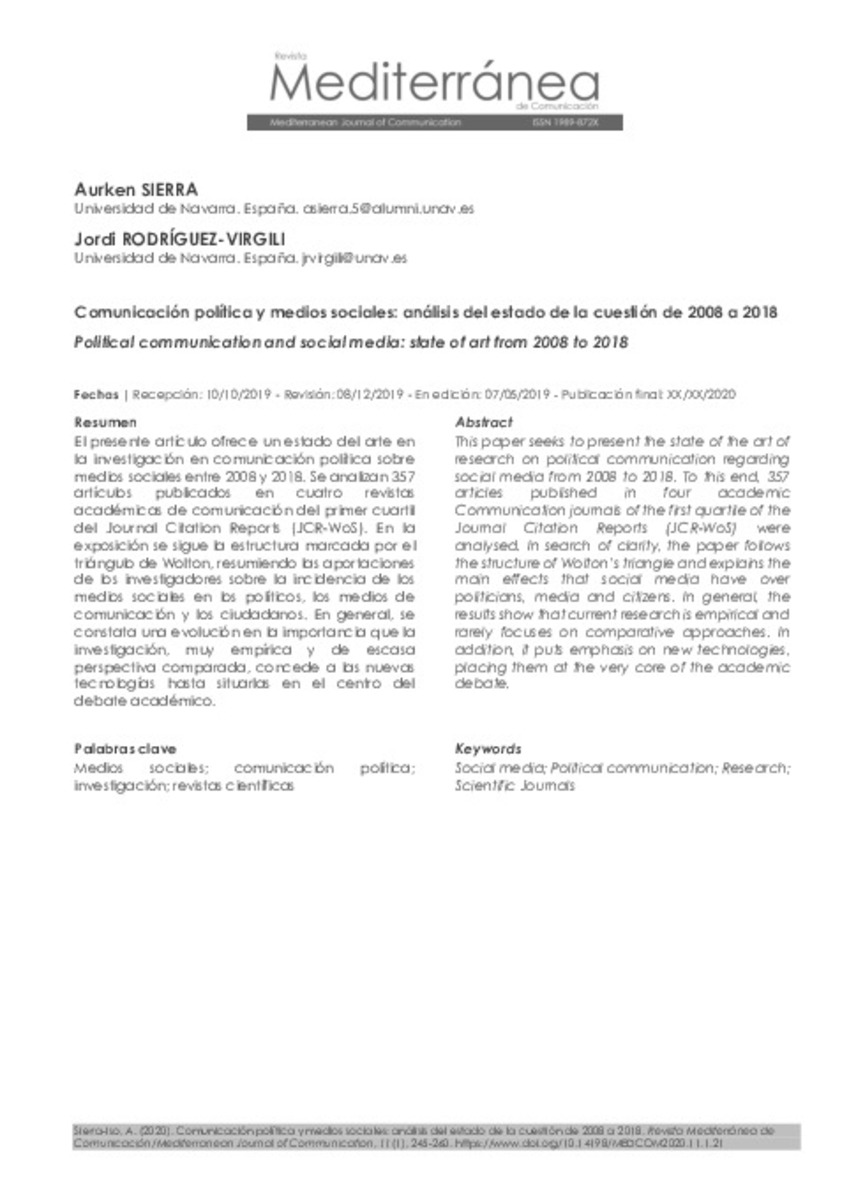Full metadata record
| DC Field | Value | Language |
|---|---|---|
| dc.creator | Rodríguez-Virgili, J. (Jordi) | - |
| dc.creator | Sierra-Iso, A. (Aurken) | - |
| dc.date.accessioned | 2020-01-30T10:48:18Z | - |
| dc.date.available | 2020-01-30T10:48:18Z | - |
| dc.date.issued | 2020 | - |
| dc.identifier.citation | Rodríguez-Virgili, J. (Jorge); Sierra, A. (Aurken). "Comunicación política y medios sociales: análisis del estado de la cuestión de 2008 a 2018". Revista mediterránea de comunicación. 11 (1), 2020, 245 - 260 | es |
| dc.identifier.issn | 1989-872X | - |
| dc.identifier.uri | https://hdl.handle.net/10171/58695 | - |
| dc.description.abstract | El presente artículo ofrece un estado del arte en la investigación en comunicación política sobre medios sociales entre 2008 y 2018. Se analizan 357 artículos publicados en cuatro revistas académicas de comunicación del primer cuartil del Journal Citation Reports (JCR-WoS). En la exposición se sigue la estructura marcada por el triángulo de Wolton, resumiendo las aportaciones de los investigadores sobre la incidencia de los medios sociales en los políticos, los medios de comunicación y los ciudadanos. En general, se constata una evolución en la importancia que la investigación, muy empírica y de escasa perspectiva comparada, concede a las nuevas tecnologías hasta situarlas en el centro del debate académico. | This paper seeks to present the state of the art of research on political communication regarding social media from 2008 to 2018. To this end, 357 articles published in four academic Communication journals of the first quartile of the Journal Citation Reports (JCR-WoS) were analysed. In search of clarity, the paper follows the structure of Wolton¿s triangle and explains the main effects that social media have over politicians, media and citizens. In general, the results show that current research is empirical and rarely focuses on comparative approaches. In addition, it puts emphasis on new technologies, placing them at the very core of the academic debate. | - |
| dc.description.abstract | This paper seeks to present the state of the art of research on political communication regarding social media from 2008 to 2018. To this end, 357 articles published in four academic Communication journals of the first quartile of the Journal Citation Reports (JCR-WoS) were analysed. In search of clarity, the paper follows the structure of Wolton’s triangle and explains the main effects that social media have over politicians, media and citizens. In general, the results show that current research is empirical and rarely focuses on comparative approaches. In addition, it puts emphasis on new technologies, placing them at the very core of the academic debate. | - |
| dc.language.iso | es | - |
| dc.rights | info:eu-repo/semantics/openAccess | - |
| dc.subject | Medios sociales | - |
| dc.subject | Comunicación política | - |
| dc.subject | Investigación | - |
| dc.subject | Revistas científicas | - |
| dc.subject | Political communication | - |
| dc.subject | Research | - |
| dc.subject | Scientific Journals | - |
| dc.title | Comunicación política y medios sociales: análisis del estado de la cuestión de 2008 a 2018 | - |
| dc.title.alternative | Political communication and social media: state of art from 2008 to 2018 | - |
| dc.type | info:eu-repo/semantics/article | - |
| dc.description.note | Licencia CC BY SA | - |
| dc.identifier.doi | 10.14198/MEDCOM2020.11.1.21 | - |
| dadun.citation.endingPage | 260 | - |
| dadun.citation.number | 1 | - |
| dadun.citation.publicationName | Revista mediterránea de comunicación | - |
| dadun.citation.startingPage | 245 | - |
| dadun.citation.volume | 11 | - |
Files in This Item:
Statistics and impact
Items in Dadun are protected by copyright, with all rights reserved, unless otherwise indicated.






